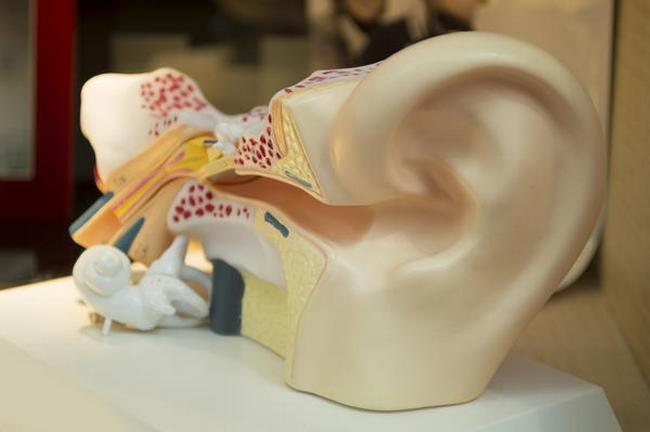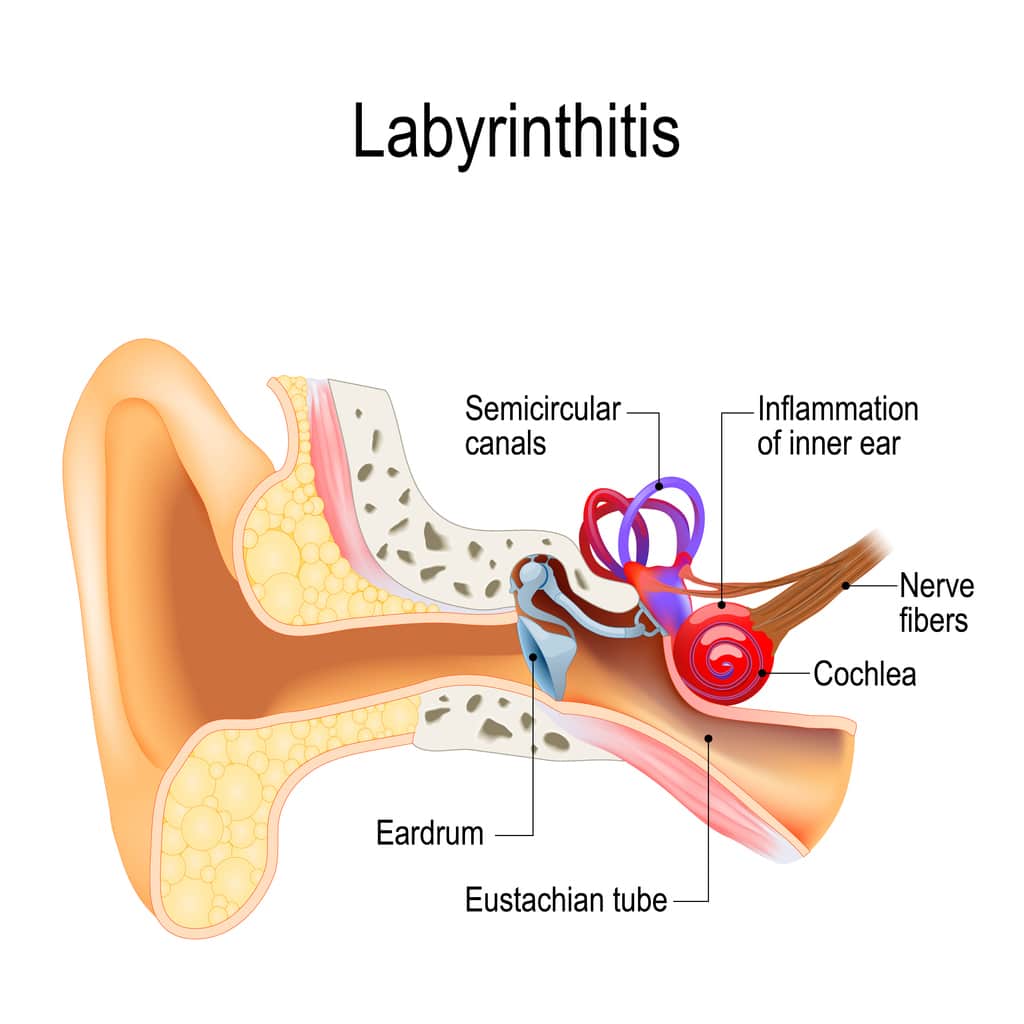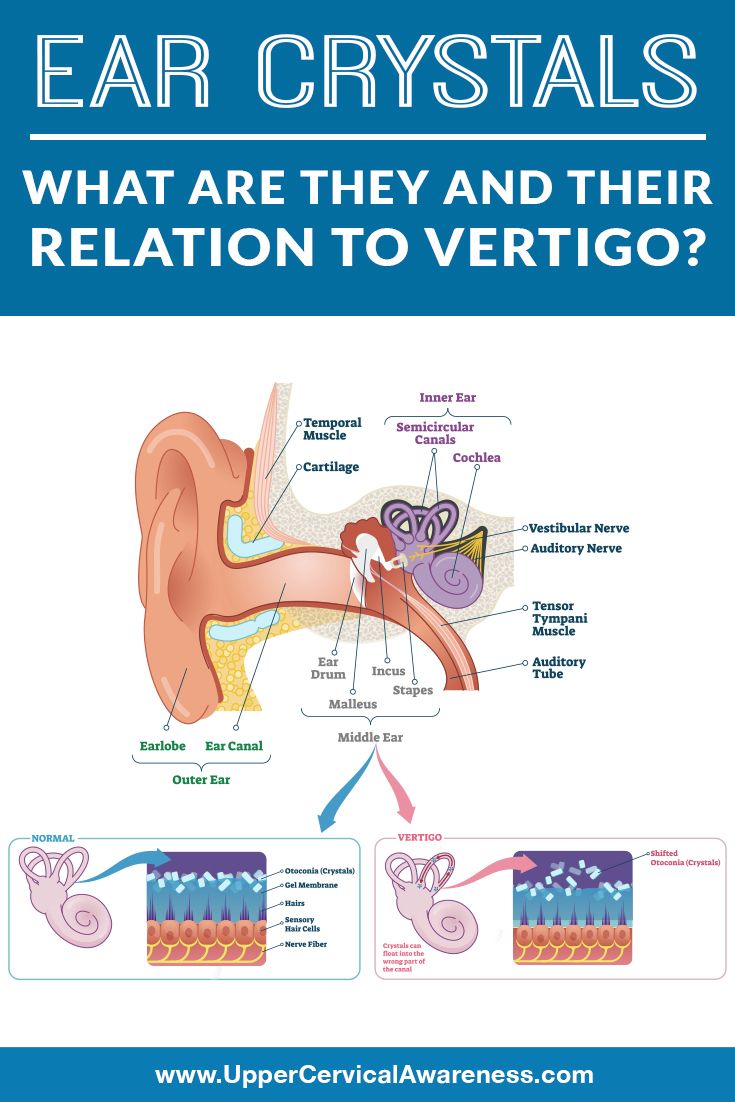Bacterial And Viral Infections
Inner ear infections that cause vestibular neuritis or labyrinthitis are usually viral rather than bacterial. Although the symptoms of bacterial and viral infections may be similar, the treatments are very different, so proper diagnosis by a physician is essential.
Bacterial
In serous labyrinthitis, bacteria that have infected the middle ear or the bone surrounding the inner ear produce toxins that invade the inner ear via the oval or round windows and inflame the cochlea, the vestibular system, or both. Serous labyrinthitis is most frequently a result of chronic, untreated middle ear infections and is characterized by subtle or mild symptoms.
Less common is suppurative labyrinthitis, in which bacterial organisms themselves invade the labyrinth. The infection originates either in the middle ear or in the cerebrospinal fluid, as a result of bacterial meningitis. Bacteria can enter the inner ear through the cochlear aqueduct or internal auditory canal, or through a fistula in the horizontal semicircular canal.
Viral
Viral infections of the inner ear are more common than bacterial infections, but less is known about them. An inner ear viral infection may be the result of a systemic viral illness or, the infection may be confined to the labyrinth or the vestibulo-cochlear nerve. Usually, only one ear is affected.
How Is An Inner Ear Infection Treated
Inner ear infections are mostly caused by viruses, so there is no role for antibiotics . But the good news is that the infection usually resolves on its own in a few days.
And while you are recovering, there are medicines that can help decrease your symptoms:
-
Antiemetics: These are medicines that help with nausea and vomiting. Examples include ondansetron or promethazine.
-
Antihistamines: These include diphenhydramine or meclizine. In addition to helping the dizziness, these medicines can also help you get some much-needed rest.
Sometimes, steroids are prescribed to decrease the inflammation from inner ear infections. But there is no convincing evidence that shows this helps, and so this treatment remains controversial.
What Causes Sinusitis Vertigo
Sinusitis vertigo is vertigo caused by a buildup of mucus in the Eustachian tube. The Eustachian tube runs from the inner ear to your throat. Its part of the system that helps you maintain your balance. When your sinuses are inflamed during a sinus infection, your sinuses can no longer drain properly. As a result, mucus and fluid build up in many areas of the ear, nose, and throat .
While some patients may describe the experience of living with sinusitis vertigo as being dizzy or feeling as if your equilibrium is off because of your sinuses, its important to note that vertigo is differentiated medically from dizziness and equilibrium issues. Specifically, vertigo is the sensation of spinning, whether the patient feels like they are spinning or the room is spinning.
Also Check: Connecting Phonak To Iphone
Don’t Miss: Warm Compress For Earache
Mayo Clinic Q And A: Dizziness Caused By Inner Ear Crystals
DEAR MAYO CLINIC: What causes BPPV, and is there a treatment for it?
ANSWER: Benign paroxysmal positional vertigo, or BPPV, is one of the most common causes of vertigo . BPPV is characterized by sudden bursts of vertigo that are caused by head movements, such as sitting up or tilting your head. What leads to the development of BPPV isnt known, but its more common in older adults.
Once you develop BPPV, the bursts of dizziness typically occur after you change the position of your head, such as when you roll over in bed. BPPV also may cause nausea and possibly vomiting, with a feeling of lingering fatigue, queasiness or a feeling of imbalance. Without treatment, these symptoms may last for as little as one day to as long as weeks or months. Fortunately, with proper diagnosis, a simple procedure may be all it takes to treat BPPV.
Your sense of balance relies on a finely tuned system that coordinates sensory information and visual information to help you determine the position of your body relative to your surroundings.
Although the canalith repositioning procedure is highly effective, BPPV can linger or return. This is more likely to happen in older adults. If this happens, you may be taught how to do the canalith repositioning procedure on your own at home.
Headaches And Inner Ear Disease

There is an increasing association between headaches and inner ear disease. Migraine-related ear symptoms may vary from patient to patient and may take the form of episodic vertigo, benign paroxysmal positional vertigo , recurrent benign positional vertigo, Menieres disease, ear pain, aural pressure, tinnitus, fluctuating hearing loss, and sudden hearing loss.
Awareness of these possible associations is important because symptoms often respond to migraine treatments.
Recommended Reading: Baby Sign For Hungry
Medicines For Labyrinthitis And Vestibular Neuritis
Your doctor can prescribe anti-sickness medicines to help with vertigo, nausea and vomiting. You usually only take these medicines for a short time because otherwise they may slow down your recovery.
Some of these medicines can cause drowsiness, so you shouldnt drive, cycle or operate machinery while taking them, even if your vertigo seems better. Speak to your doctor about how your medicine may affect you and always read the patient information leaflet that comes with it.
Antibiotics dont work for vestibular neuritis or labyrinthitis, but if you have an underlying bacterial middle ear infection, they may be prescribed to help with that.
Can Ear Problems Cause Dizziness
- 4:59 pm
Do ear problems cause dizziness?
Most people experience dizziness at some point in their life. The terms dizziness and vertigo are often used interchangeably, but they mean two different things. Vertigo is the feeling of being dizzy caused by spinning. You are still and the environment seems to be spinning around you. Dizziness is the feeling of being unbalanced without spinning. There are many causes of dizziness, and some of them are caused by your ears.
Also Check: Hungry Sign Language
Ways To Relieve Headache Or Migraine Pain
Sinus headaches happen when the sinuses become blocked and swollen. It is very common to experience facial pain and headaches when you have sinusitis. There are lots of different self-help techniques you can try at home to relieve symptoms, but in severe cases should go to an ENT specialist.
Breathing moist air, using hot and cold compresses to ease swelling, and taking over-the-counter medication can help. If your headaches do not improve, you may need more intensive treatments.
How Long Does Dizziness Last With An Inner Ear Infection
The symptoms of labyrinthitis usually go away in a couple of weeks. In the meantime, treatments can help to reduce dizziness, vertigo, and other symptoms. Additionally, severe symptoms usually only last a week, and most people are usually back to 100 percent in 2 to 3 months. Older adults, however, are likely to have longer-lasting dizziness.
- Antibiotics for bacterial infections
If the symptoms of labyrinthitis have gone away within a few weeks, all of your treatment should be complete. If, on the other hand, the symptoms remain, your doctor could have you do vestibular rehabilitation exercises. These physical therapy exercises can help your brain to adequately respond to the imbalance that the infection caused.
Recommended Reading: Abc Alphabet Sign Language
Instructions For Patients After Office Treatment
To increase the success of the Epley maneuver you will be asked to:
- Wear the cervical collar for the next 7 days during the daytime
- You will take it off for napping or sleeping
- For the first 2 nights, sleep upright or at a 45 degree angle, in a recliner or in your bed with pillows behind your back.
- From 3rd night onwards, sleep on your back or on the opposite ear.
- You will be seen in one week for a follow up appointment to check for the resolution of vertigo
This treatment has a cure rate of 80% and repeat treatments may be necessary in the other 20% of the symptomatic patients. In rare cases, if repeat treatments fail, a surgical procedure called posterior semicircular canal occlusion can be performed.
What Can I Do About My Symptoms
- Donât move too quickly you might lose your balance.
- Remove tripping hazards like area rugs and electrical cords. Put non-slip mats in your bath and shower.
- If you start to feel dizzy, lie down right away. People with vertigo often feel better if they lie down in a quiet, darkened room with their eyes closed.
- Drink lots of fluids and eat well. Avoid caffeine, alcohol, salt, and tobacco.
- If you think your meds are making you feel dizzy, talk to your doctor. They may change your dose, have you stop using them, or try something else.
- Donât drive if you have dizzy spells.
Read Also: What Is The Sign Language For God
What Are The Complications Of Swimmers Ear
People with diabetes or those whose immune systems are weakened can develop a more worrisome form of the disorder that might require hospitalization for intensive medical treatment. This is referred to as malignant otitis externa and is not related to swimmers ear, per se. If a person is concerned about malignant otitis externa, an evaluation by a health-care professional or an emergency department is imperative as this can be a serious condition. Although the two entities sound the same, they are distinctly different, and also are managed differently.
Its Easy To Get The Care You Need

See a Premier Physician Network provider near you.
Though an earache might be something most people remember from childhood, adults are not immune from them.
Ear pain in adults is less likely to be caused by an ear infection than ear pain in children.
In adults, the pain is more likely caused by one of a variety of issues:
- Arthritis of the jaw
- Tooth infection
Symptoms of an earache can include pain, fever, ear drainage, nausea, and vomiting.
When an adult has an earache, its important to treat the root cause of the problem, even if that problem isnt directly related to the ear, such as arthritis of the jaw.
If you experience ear pain that doesnt go away or gets worse within 24 to 48 hours you should call your doctors office.
Also call your doctor if you have severe pain that suddenly stops. This could be a sign that your eardrum has ruptured.
The type of earache you have determines the best treatment:
- For a general earache. Take over-the-counter pain relievers, rest in an upright position instead of lying down, and put a cold pack on the outer ear for 20 minutes
- For ear pain from pressure change. Swallow hard or chew gum
- For earaches caused by other medical issues. Visit your doctor to determine the best treatment on a case-by-case basis. This includes causes such as excess wax buildup, object in ear, sinus infection, sore throat, and tooth infection.
Also Check: Witch Hazel Ear Infection
Read Also: What Does It Mean When Your Ears Ring Spiritually
What Are Labyrinthitis And Vestibular Neuritis
Labyrinthitis and vestibular neuritis affect different parts of your inner ear. Your inner ear is made up of a system of fluid-filled tubes called the labyrinth. This includes your cochlea, which senses sound, and your vestibular system, which senses movement of your head and helps with balance. Your vestibular nerve passes through your inner ear, taking messages to your brain.
- With vestibular neuritis, only your vestibular nerve is affected. This causes vertigo , and problems with balance.
- With labyrinthitis, your labyrinth is affected too, which causes hearing loss as well as problems with balance.
Labyrinthitis and vestibular neuritis can affect both adults and children, but they’re most common between the ages of 30 and 60.
How To Best Alleviate Sinus Pressure
The 7 Best Ways to Relieve Sinus Pressure, According to DoctorsUse some steam-but dont expect a long-term cure. Steam-whether from a humidifier or a hot shower-can provide some symptomatic comfort, but isnt really a long-term solution, Mas Takashima, M.D., Try nasal irrigation. Dr. Stay hydrated . Use decongestants, but only temporarily. Pop a pain reliever like aspirin or ibuprofen. More items
You May Like: Hungry Asl
What Are The Symptoms Of Vestibular Neuritis
Symptoms include:
- Nausea, vomiting
- Concentration difficulties
Vestibular neuritis and labyrinthitis are closely related disorders. Vestibular neuritis involves swelling of a branch of the vestibulocochlear nerve that affects balance. Labyrinthitis involves the swelling of both branches of the vestibulocochlear nerve that affects balance and hearing. The symptoms of labyrinthitis are the same as vestibular neuritis plus the additional symptoms of tinnitus and/or hearing loss.
Generally, the most severe symptoms only last a couple of days, but while present, make it extremely difficult to perform routine activities of daily living. After the severe symptoms lessen, most patients make a slow, but full recovery over the next several weeks . However, some patients can experience balance and dizziness problems that can last for several months.
How Is Vestibular Neuritis Diagnosed
In most patients, a diagnosis of vestibular neuritis can be made with an office visit to a vestibular specialist. These specialists include an otologist or neurotologist . Referral to an audiologist may be made to perform tests to further evaluate hearing and vestibular damage. Tests to help determine if symptoms might be caused by vestibular neuritis include hearing tests, vestibular tests and a test to determine if a portion of the vestibulocochlear nerve has been damaged. Another specific test, called a head impulse test, examines how difficult it is to maintain focus on objects during rapid head movements. The presence of nystagmus, which is uncontrollable rapid eye movement, is a sign of vestibular neuritis.
If symptoms continue beyond a few weeks or become worse, other tests are performed to determine if other illnesses or diseases are causing the same symptoms. Some of these other possible health conditions include stroke, head injury, brain tumor, and migraine headache. To rule out some of the disorders of the brain, an MRI with dye may be ordered.
Also Check: What Does Ringing In My Ear Mean Spiritually
What Does An Ear Infection Look Like
Middle EarYou cannot see into the middle ear, but using an otoscope to perform an ear examination, a doctor can observe visible signs of ear infection in the middle ear that might include:
- A bulging eardrum
- An eardrum that is immobile in response to pressure changes
- A perforation of the eardrum, and associated signs of bloody or purulent drainage.
Inner EarInfections in the inner ear are not directly visible. If there is reason to believe an infection in the inner ear exists based on description of the ear infection symptoms, then a head CT scan, MRI of the head, EEG, electronystagmography, or hearing test might be administered.
Outer EarSigns of ear Infection in the outer ear are more easily visible. Purulent debris and redness at the ear canal might be visible, if the infection is fungal a furuncle can be observed.
What Are Dizziness & Balance Disorders
Dizziness is a sensation of unsteadiness or spinning. When people are dizzy, they may feel as if theyre spinning or floating. Dizziness can occur as a result of normal daily activities, such as standing up too quickly. However, more serious bouts of dizziness may be the result or symptom of a balance disorder.
Balance disorders refer to a range of conditions that cause symptoms of dizziness, including feeling like youre floating, spinning or moving even while remaining still. While the occasional dizzy spell is normal, balance disorders cause chronic unsteadiness, which can present significant risk to overall health and lifestyle. Common balance disorders include:
Recommended Reading: Ear Curette Walgreens
Further Information About Labyrinthitis
You can also read more about labyrinthitis on the NHS Choices website and watch the video ‘Labyrinthitis and Vertigo’ produced by NHS Choices.
If you have found our information helpful, why not become a member. As well as supporting our work, we’ll keep you informed about the latest management/treatment options for vestibular disorders and what research is taking place. Find out more about membership.
If membership isnt for you, please consider making a donation to support our work and help us continue to supporting people affected by labyrinthitis and other vestibular conditions. Donate Now!
Joy Victory Managing Editor Healthy Hearing

Joy Victory has extensive experience editing consumer health information. Her training in particular has focused on how to best communicate evidence-based medical guidelines and clinical trial results to the public. She strives to make health content accurate, accessible and engaging to the public.Read more about Joy.
Also Check: Alcohol Ringing In Ears
What Kind Of Physical Therapy Works To Reduce Vertigo
Its called vestibular rehabilitation, and it is a relatively new form of physical therapy. Not all physical therapists are trained in the practice. Typically the exercises consist of movements that initially make the vertigo worse and balance tasks that are quite difficult. By doing these repetitively, the balance system in the brain learns to function better. Common exercises include moving the eyes from side to side, rotating the head from side to side, rotating the head from side to side while walking down a corridor, and things like this.
You May Like: Pairing Phonak Compilot
Olive Oil For Pain Behind The Ear
You can use olive oil as a natural medicine to soften ear wax and help treat a mild infection of the outer ear. Warm olive oil helps to loosen and dissolve ear wax to naturally unblock your ears.
How to use olive oil for earache:
You can also use food grade 3% hydrogen peroxide to help clear a mild outer ear infection that is causing you pain.
Read Also: Sign Language Angel